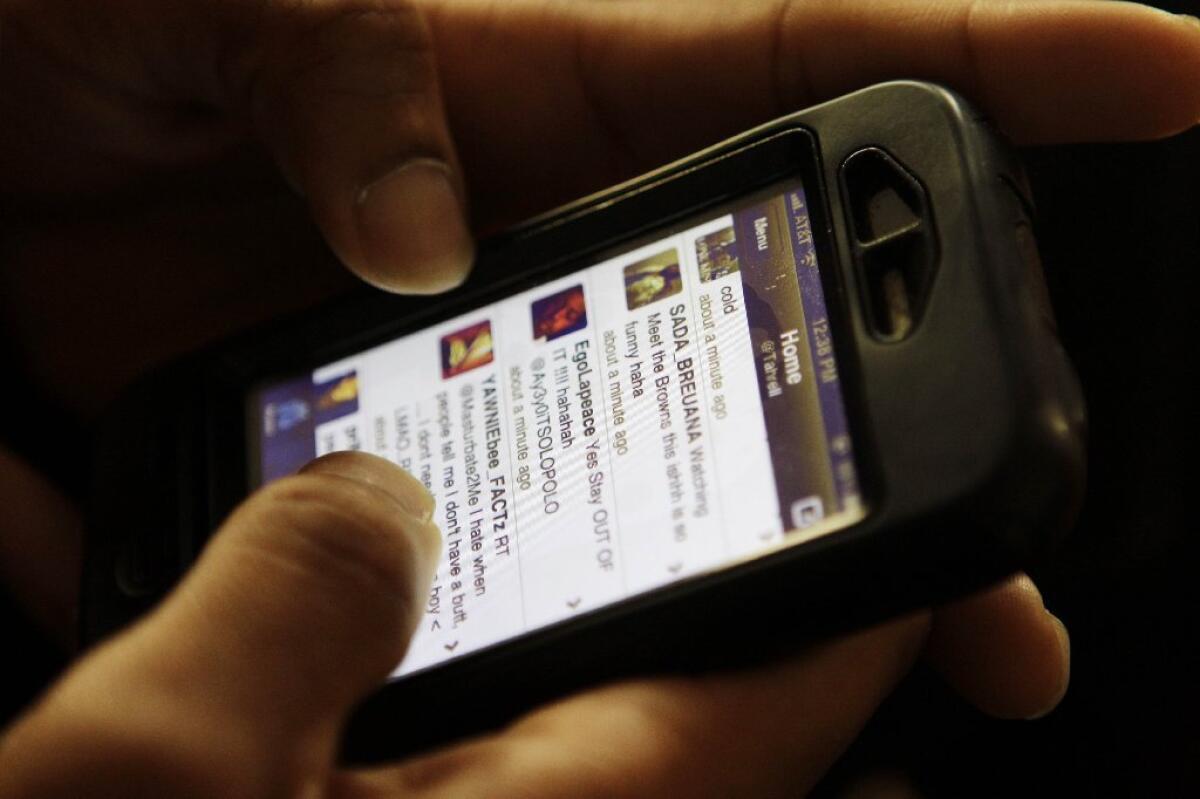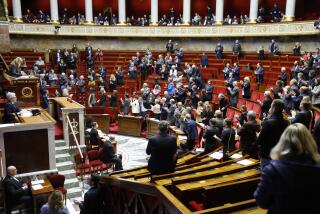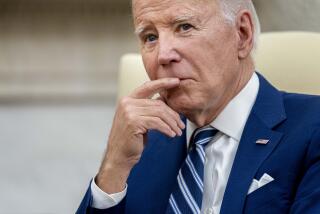Your Twitter feed says more about your political views than you think, study says

The language you use on Twitter can reveal your political leanings, a new study has found.
- Share via
You can get a pretty good idea of whether an American is liberal or conservative just by looking at his or her Twitter feed, new research shows.
It’s not simply because liberals tweet phrases like “universal healthcare” while conservatives tweet about the military — although there are certain political buzzwords each side tends to favor. Whether a person tends to tweet in the first-person singular (“I”) or plural (“we”) also can be revealing, and so can the intensity of emotion contained in the tweets.
“Language encodes who we are, how we think and what we feel,” Karolina Sylwester and Matthew Purver wrote in a study published this week in the journal PLOS ONE. “Even in a noisy Twitter data set, patterns of language use are consistent with findings obtained through classical psychology methods.”
Those methods usually involve surveys, and survey-takers sometimes give answers that are more socially acceptable than honest. Even though only about 14% of American adults are on Twitter, their tweets have the advantage of being more candid, Sylwester and Purver wrote.
The pair, both members of the Cognitive Science Research Group at Queen Mary University of London, rounded up all of the Twitter users who were following the @GOP, @HouseGOP, @Senate_GOPs, @TheDemocrats, @HouseDemocrats and @SenateDems accounts. They removed anyone who followed feeds from both sides of the aisle, leaving 316,590 presumed Republicans and 363,348 Democrats.
From that pool, they randomly selected 17,000 people from each party. After eliminating users who didn’t make their tweets public, who hadn’t tweeted recently or who didn’t tweet very often, they were able to analyze 466,386 tweets by 5,386 Republicans and 457,372 tweets by 5,373 Democrats.
Instead of focusing on the words people used most, they examined the most “differentiating” words — that is, words that were embraced by one group and largely ignored by the other.
For Republicans, the researchers found, these words fell into several broad categories — religion (“God,” “psalm”), national identity (including “America,” “American” and “border”), in-group identity (the word stem “conserv” and the acronyms TCOT for “top conservative on Twitter” and RINO for “Republican in name only”), government and law (including “lie,” “vote,” “impeach” and “defund”), and political opponents (“Obama,” “Reid” and “Pelosi”).
The differentiating words used by Democrats didn’t have these political and patriotic overtones. Instead, they focused on cultural items that were big deals when the tweets were collected in June 2014 (including “World Cup” and “Arsenal”) as well as words the study authors described as “more emotionally expressive” (such as “love” and “feel,” the word stems “happi” and “amaz,” and four-letter words that start with “F” and “S”).
The analysis revealed that certain words were more likely to be tweeted by conservatives and others were more likely to be tweeted by liberals. For instance, Republicans were 3.36 times more likely than Democrats to say “Obamacare” and 1.40 more likely to tweet about “God.” On the flip side, Democrats were 6.51 times more likely to type “birther” and 3.7 times more likely to tweet about “Bridgegate.”
These trends had predictive value. A “one unit increase” in the use of swear words increased the odds that the Twitter user was a Democrat by 20%. The same increase in the use of religious words increased the odds that the user was a Republican by 15%, according to the study.
“These results suggest that language used on Twitter does, indeed, reflect individual differences between liberals and conservatives,” the researchers wrote.
Sylwester and Purver also noticed that the presumed Democrats “tend to use first-person singular pronouns more often than Republican followers, which we interpret as their greater desire for emphasizing uniqueness.”
The researchers also found that the typical Republican account had more followers (about 219) than the typical Democratic account (about 201). In addition, Republicans mentioned other people’s Twitter handles at a higher rate than Democrats. However, Democrats tended to follow more accounts on Twitter (about 78) than Republicans (about 52).
The pair from London hinted that their efforts to mine Americans’ political expressions on Twitter have just gotten started.
“It would be exciting to investigate how the language of Democrats and Republicans on Twitter changes over time in the context of the 2016 U.S. election,” they wrote.
Follow me on Twitter @LATkarenkaplan and “like” Los Angeles Times Science & Health on Facebook.







